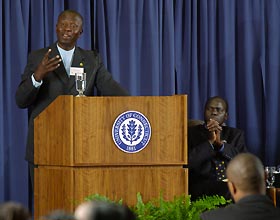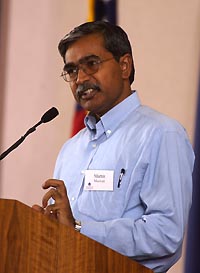|
This is an archived article.
For the latest news, go to the Advance
Homepage
For more archives, go to the Advance Archive/Search Page. |
||||
|
Human
Rights Speakers Discuss
Ways to Build a Better World By Allison Thompson "What do you want to do with your life?" This simple but profound question was explored in various forms by many of the speakers during the third annual comparative human rights conference Oct. 22, who urged the more than 500 people who attended to get involved in the cause of human rights and try to make the world a better place. The conference, "Effective Approaches to the Realization of Human Rights," was organized by the UNESCO Chair & Institute of Comparative Human Rights.
After posing the question to the students in the audience, class action attorney Ed Fagan noted that many of the conference speakers had sacrificed their lives in order to change their part of the world. As young people, he speculated, none of them would have said they wanted to be thrown in prison and martyred: "They would have said, 'We want our rights'," he said. "There's absolutely no difference between them and you," he told the audience, "except they happened to find themselves in a situation that thrust them into certain events and taking certain actions." When people play up the differences between various groups, he said, it often leads to discrimination. Fagan has taken on corporations and governments around the world in an effort to achieve compensation for losses suffered through injustice, including suffering caused by discrimination. He won a multi-billion dollar settlement on behalf of Jewish victims of Nazism, and is currently working on a lawsuit seeking reparations for African Americans from U.S. companies that profited from the slave trade, and another that seeks reparations for apartheid victims from U.S. and Swiss banks that profited from South Africa's apartheid regime. The possible recurrence of destructive systems like slavery and apartheid in the future can be stopped by people who vow now to make a difference, said Fagan. "You really can stop it," he said, "but if you sit by in silence, you're as guilty as the people who do it." The theme of taking a stand to make a positive difference was discussed by other speakers. Keynote speaker Dikgang Moseneke, a High Court Judge in South Africa, described his country's transition from a nation "totally devoid of the observance of human rights, to a constitutional democracy which today holds the promise of better life for all South Africans." He noted that the transition came about because many individuals committed themselves to the struggle against a system where the distribution of resources was skewed on the basis of race. Yet the consequences of resistance were life imprisonment, detention without trial, and torture, he said. During lunch, Moseneke told high school students that when he was a teenager, he rejected the notion anybody could say he was inferior to him or her: "I went to prison for 10 years at the age of 15 for political activity - not for crime, but because I wanted to uphold my own dignity." If people who are discriminated against can't change the system any other way, they may "refuse to play by the rules until the rules are fair," he said. "That's a choice I made, that Nelson Mandela made, that Ahmed Kathrada made." Kathrada, a veteran of the anti-apartheid struggle who spent 26 years as a political prisoner with Mandela, was also a speaker at the conference. He told of the discrimination they faced even in prison. Of eight co-defendants, the one white man was sent to a different prison; Kathrada, who is of Indian descent, was the only one of the seven imprisoned on Robben Island who was not black. He was given long pants, socks, and shoes, while his black colleagues "got short trousers, no socks, and were lucky if they had sandals." They were also given inferior food. After three years, through hunger strikes and other protests, the prisoners succeeded in equalizing the clothing given to different races, but it took more than a decade before they received the same food. He also noted that "even in the face of adversity and violence in prison, people were determined to study." Many South African political prisoners, including Mandela, Moseneke, and Kathrada, earned university degrees during their incarceration. "The prison experience was difficult, there was a lot of suffering, but the total message is one of triumph. The authorities did everything possible to crush the spirit of the prisoners but they failed," said Kathrada. "From the prisons of South Africa there emerged leaders in every field of society." Charlotte McClain, a commissioner of the South African Human Rights Commission, noted that the country's new constitution, drafted by Moseneke and others, has served as "the birth certificate of our nation." Since the end of apartheid, there has been significant political, economic and social transformation in South Africa, she said, even though enormous challenges remain. The Human Rights Commission was created by the constitution to ensure the observance of human rights for all South Africans, without distinction. "Human rights are an essential ingredient for democracy, and the vehicle for a better life for all," she said. The Commission's task is "to ensure that human rights are not paper rights but living rights enjoyed by all South Africans." Lawyer and activist Martin Macwan, who spoke during an afternoon panel, works to end discrimination against the "untouchable" caste in India, the 160 million Dalits. Although it was abolished under the constitution in 1950, Dalits continue to face discrimination at every level. "There is total segregation," said Macwan. "Even if their shadow falls on another person, that person is considered polluted." He noted that in many schools, Dalit children are made to sit separately in the classroom or even outside. Fifty percent of Dalit children don't finish primary education but go to work in the fields and factories. He expressed the hope that his movement could learn from the experience of South Africa, where global support helped bring about the end of apartheid. A concurrent panel of UNESCO Human Rights Chairs discussed the necessity of human rights education, the transmission of values, and the dissemination of information on human rights. Curt Goering, senior deputy executive director of Amnesty International USA, gave the closing address. He said the conference was timely: "As we meet today, the international system of human rights that's been painstakingly built over the last 50 years is being severely challenged." He said there have been "worrying developments" since Sept. 11, such as the rounding up of more than 1,000 people of Middle Eastern and Asian descent in the United States and the introduction of indefinite detention without trial in Britain. Expressing concerns about the prospect of war with Iraq, Goering said the choice that has been posed between terrorism and freedom is a false one. "The real choice is between a world in which human rights are universally respected and one in which no one is safe," he said. He encouraged conference participants, especially the young people, to become involved in the struggle for human rights. "All successful social movements have had students at their core," he said. "In this interconnected and globalized world, our welfare is inextricably bound to our neighbors' welfare," Goering said. "By creating a more just world for more people, we are also making a safer world for ourselves." |


